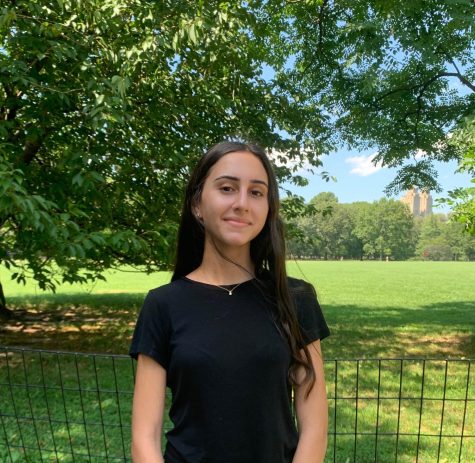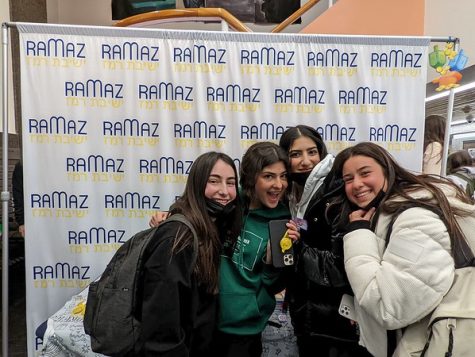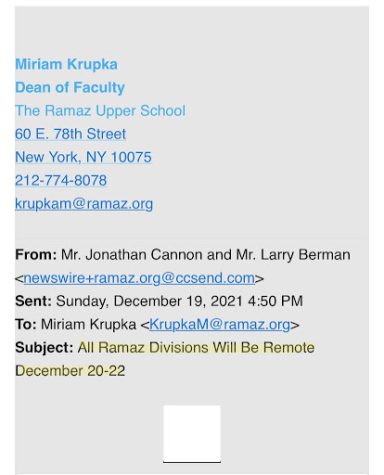College Guidance for Juniors Remains Strong

The College Guidance Office has remained active and supportive during this time of social distancing. Throughout the quarantine, the college office has sent many emails to the juniors to ensure they are staying informed and on top of the upcoming college admission process. In addition to the comprehensive emails, the college office planned a virtual college night, which surpassed the expectations of most students.
Juniors received information about different ways to research colleges and demonstrate interest in certain schools, despite the inability to visit these schools. Guidance counselors suggested that the juniors sign up for schools’ email lists, scavenge the school’s websites, follow the schools on social media, email the Hillel or Chabad, and read reviews of schools written by students. The College Guidance Office also sent an email with options for summer activities, given that many internships and programs are canceled because of the pandemic. The email featured different online courses and community service opportunities, as well as internships and personal projects to pursue. The college office also listed the schools that decided to go test-optional, meaning they do not require standardized testing (either for the upcoming admissions cycle, or as a lasting change). The email also featured how to prepare for a possible August test.
In addition to the many, informative email communications, the college office also coordinated a meeting on Monday, April 27 with Ms. Grace Chapin James, Deputy Director of Admissions at the University of Chicago, and Mr. Craig Broccoli, Associate Director of Admissions at Binghamton University, to discuss how COVID-19 will impact the admissions process for next year. Ms. Messinger, the panel initiator, prefaced her remarks by reminding the students that each school has its own policy, so what one school discusses may not apply to other schools. She also acknowledged that, as has been the recent trend, things can change daily.
The first topic discussed with the college representative was how to research colleges. Ms. James advised students to explore the virtual college tours and informational sessions on Zoom. Students can participate in Zoom information sessions at the University of Chicago any day of the week. The representative from Binghamton University said that faculty at Binghamton are opening up classroom sessions to the public.
Ms. Messinger commented that although neither Binghamton nor UChicago tracks demonstrated interest in their applicants, there are many schools that do. Ms. James pointed out that, at least for UChicago, students should demonstrate a true interest in learning. She mentioned that she has received emails with very basic and generic questions that can be answered in an info session.
Next, Ms. Messinger asked about transcripts. Ramaz is grading second-semester juniors (i.e. not on a pass/fail system), while other schools are not. How will these grades be interpreted by schools? Mr. Broccoli said that they are looking at students relative to the school which the student attends and taking into account the adjustment period students are going through. He also said that both in Ramaz and in schools that are pass/fail the developments and changes students are going through can be reflected in letters of recommendation. Senior-year grades will also take on greater importance than in previous years.
Ms. Messinger’s next question was about standardized testing. UChicago is already test-optional, but how does the university review an application with no testing? Ms. James compared an application to a pot of soup. For some applicants, the lack of a standardized test is a missing ingredient, since the other ingredients are not very tasty. But, in other applications, the ingredient is not missed. Mr. Broccoli said that while Binghamton supports schools that are test-optional, Binghamton is still interested in the SAT/ACT for now.
Next Ms. Messinger asked about extra-curricular activities and summer plans, especially during this time period. Ms. Messinger asked if students should spend their summer learning a new talent or skill that they can write about on their application. Both representatives agreed that it would be impressive but not obligatory.
Ms. Messinger asked the representatives about essays. She wanted to know if the representatives advise students to mention COVID-19 in their college essays, as many likely will. Ms. James recommended against mentioning COVID-19 and reminded students that they had a life before the virus, one they should focus on. Mr. Broccoli added that the admissions office knows that students are dealing with complex issues, but it’s not necessarily a topic best suited for a college essay. He mentioned that those tend to be topics relating more to financial aid. Overall, the virtual meeting was very informative and addressed many of the juniors’ pressing questions. The college office continues to be a wonderful resource to juniors (and seniors) during these unprecedented times.

Caitlin Levine loves journalism, is an avid writer, and is thrilled to be an editor-in-chief of The Rampage. Caitlin has actively contributed to The Rampage...







